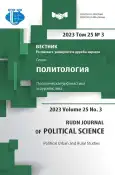Движение городов-побратимов в управлении региональной политикой: опыт новых территорий
- Авторы: Волкова А.В.1, Кулакова Т.А.1
-
Учреждения:
- Санкт-Петербургский государственный университет
- Выпуск: Том 25, № 3 (2023): Политическая урбанистика и руралистика
- Страницы: 581-600
- Раздел: ПУБЛИЧНАЯ ПОЛИТИКА В ГОРОДСКИХ СОЦИАЛЬНЫХ ЛАНДШАФТАХ
- URL: https://journal-vniispk.ru/2313-1438/article/view/322215
- DOI: https://doi.org/10.22363/2313-1438-2023-25-3-581-600
- EDN: https://elibrary.ru/TMOKQR
- ID: 322215
Цитировать
Полный текст
Аннотация
Институт городов-побратимов в условиях развивающегося международного кризиса, когда городская дипломатия, успешная практика межгосударственного гражданского сотрудничества, десятилетиями воспринимаемые как незыблемые и ценностно ориентированные, оказались подвергнуты «приостановке» или «отмене», сталкивается с серьезными вызовами. Вместе с тем территориальные изменения 2022 г., вхождение новых территорий в состав России и установление отношений побратимства российских городов с городами Донбасса придают институту городов-побратимов новый смысл и важное политико-культурное значение. Формирование и развитие аксиосферы городов-побратимов видится важным фактором развития межрегионального сотрудничества и «связывания» российских территорий. Междисциплинарность настоящего исследования выражается в обращении не только к вопросам публичной политики, социальной философии, культурологии, этики, экономики, но и в стремлении учесть специфику развивающегося цифрового общества, при этом авторы рассматривают вопросы регионального управления с позиции аксиологического подхода. Авторы отмечают важность гражданских инициатив и движений, социальных медиа, деятельность которых направлена на поддержание социальной сферы и формирование цифровой среды доверия, на интенсификацию городского, гражданского сотрудничества в сети как противовес используемым сегодня агрессивным сетевым практикам антироссийского характера.
Об авторах
Анна Владимировна Волкова
Санкт-Петербургский государственный университет
Автор, ответственный за переписку.
Email: AV.Volkova@rambler.ru
ORCID iD: 0000-0002-3687-5728
доктор политических наук, профессор кафедры политического управления, факультет политологии
Санкт-Петербург, Российская ФедерацияТатьяна Александровна Кулакова
Санкт-Петербургский государственный университет
Email: t.kulakova@spbu.ru
ORCID iD: 0000-0003-3386-8079
доктор политических наук, профессор, кафедры политического управления, факультет политологии
Санкт-Петербург, Российская ФедерацияСписок литературы
- Bakulina, S.D. (2013). Axiosphere of the region: Experiences of translation and ways of representing the culture of the place (on the material of the southern regions of Western Siberia). Omsk: OmGPU Publishing House. (In Russian).
- Blatter, J. (2003). Beyond hierarchies and networks: Institutional logics and change in transboundary spaces. Governance, 4(16), 503–526. https://doi.org/10.1111/1468-0491.00226
- Danilov, A.N. (2022). Culture as a “melting pot” of history: The value profile of a new civilization. In A.A. Ivanenko (ed.), Philosophy of the History of Philosophy (pp. 7–19). St. Petersburg: Publishing House of St. Petersburg State University. (In Russian).
- Komninos, N. (2015). The age of intelligent cities: Smart environments and innovation-for-all strategies. L&NY: Routledge.
- Korab-Karpowicz, W. (2019). The Clash of epochs: Traditional, modern, postmodern, and evolutionity. Perspectives on Political Science, 3(48), 170–182. https://doi.org/10.1080/10457097.2019.1576435
- Kulakova, T.A., & Volkova, A.V. (2022). Digital vigilantism: Spectacle versus reality? In A.A. Ivanenko (ed.), Philosophy of the History of Philosophy (pp. 107–125). St. Petersburg: St. Petersburg State University. (In Russian). https://doi.org/10.21638/spbu17.2023.108
- Kulakova, T.A., & Volkova, A.V. (2023). Digital sovereignty and political and administrative regimes. Bulletin of St. Petersburg University. Philosophy and conflictology, 1(39), 92–105. (In Russian).
- Lauсht, C., & Allbeson, T. (2023). Twin Cities, Special ed.: Urban Internationalism: Coventry, Kiel, Reconstruction and the Role of Cities in British-German Reconciliation, 1945–49. Urban History file. Retrieved May 30, 2023, from https://orca.cardiff.ac.uk/id/eprint/156273/1/TWIN_Cities_Spec_ed_Urban_Internationalism_Coventry_Kiel_1945_49_rev_final_final_ edit.pdf
- Martyanov, D.S., & Lukyanova, G.V. (2021). Emotional public sphere: Polarization of paralinguistic internet discourse. Bulletin of Moscow University. Series 10: Journalism, (2), 25–48. (In Russian). https://doi.org/10.30547/vestnik.journ.2.2021.2548
- Mikhailova, E., & Wu, C.-T. (2017). Ersatz twin city formation? The case of Blagoveshchensk and Heihe. Journal of Borderlands Studies, 4(32), 513–533. https://doi.org/10.1080/08865655.2016.1222878
- Nawratek, K. (2011). City as political idea. Plymouth: Plymouth University Press.
- Nawratek, K. (2012). Holes in the whole. Introduction to the urban revolutions. WinchesterWashington: Zero Books.
- Nye, J.S. (2005). Soft power: The means to success in worlds politics, New York: Public Affairs Press.
- Pashkus, V.Yu. (2022). Breakthrough positioning strategy and its application in the promotion of brands of territories. In V.A. Gutorov & D.A. Maltseva (Eds.), Modern political strategies (pp.164-188). SPb.: Russian Christian Humanitarian Academy. (In Russian).
- Popova, O.V. (2021). Student youth of Russian megalopolises: value orientations and effects of political online mobilization. Bulletin of the Russian Foundation for Basic Research. Humanities and social sciences, 5(107), 118–129. (In Russian). https://doi.org/10.22204/2587-8956-2021-107-05-121-132
- Pustoshinskoy, O.S., Simons, G., & Nikulenkov, V.V. (Eds.) (2021). Twin cities: State, development opportunities, challenges, priorities. International Scientific and Practical Conference. Tyumen: Tyumen Publishing House. (In Russian).
- Rozov, N.S. (1998). Values in a problematic world: Philosophical foundations and social applications of constructive axiology. Novosibirsk: NGU Publishing House, 1998.
- Schmidt, E., & Cohen, J. (2013). New digital world. Moscow: Mann, Ivanov and Ferber, 2013. (In Russian).
- Shcherbinin, A.I. (2021). Socio-political problems of the city in a rapidly changing world on the border of research. In T.A. Senyushkina (Ed.), Political space and social time: Global challenges and civilizational responses. Collection of scientific papers of the XXXVII International Harak Forum (pp. 483–488). Simferopol: Arial. (In Russian).
- Shcherbinin, A.I., & Shcherbinina, N.G. (2022). “Right to the city”: Political construction of the post-pandemic world order. Tomsk State University Bulletin, (474), 169–177. (In Russian). https://doi.org/10.17223/15617793/474/19
- Solovyov, A.I. (2021). Politics and government. Essays on theory and methodology. Moscow: Publishing House Aspect Press. (In Russian).
- Valley, M. (2018). Becoming a citizen scientist. Global Dialogue, 1(8), 18–19.
- Volkova, A.V., & Borisova, O.V. (2020). Civil assessment of the development of the innovation infrastructure of the metropolis: Challenges and lessons of modern administrative reform. Bulletin of the Perm University. Political science, 1(14), 88–96. (In Russian). http://doi.org/10.17072/2218-1067-2020-1-88-96
- Volkova, A.V., & Kulakova, T.A. (2021). Network, procedural and cognitive components of digital public governance implementation designs: The experience of European countries. Vestnik of Saint Petersburg University. Philosophy and Conflict Studies, 1(37), 118–135. https://doi.org/10.21638/spbu17.2021.110
- Vulfovich, R.M. (2019). City as a platform: myth or reality? Scientific works of the North-Western Institute of Management RANEPA, 2(10), 63–68. (In Russian).
- Vyzhletsov, G.P. (2016). Axiology of culture at the turn of the century. International Journal of Cultural Studies, 2(23), 15–26. (In Russian).
Дополнительные файлы









